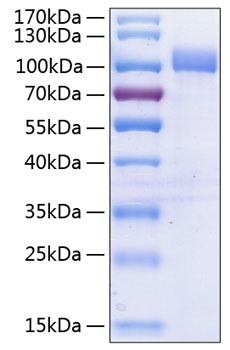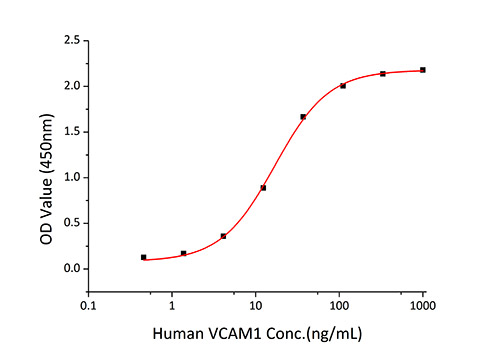Recombinant Human VCAM-1/CD106 Protein (RPCB0835)
- SKU:
- RPCB0835
- Size:
- 10µg
- Tag:
- C-His
- Reactivity:
- Human
- Expression Host:
- HEK293 cells
Description
| Product Name: | Recombinant Human VCAM-1/CD106 Protein |
| SKU: | RPCB0835 |
| Size: | 10µg |
| Tag: | C-His |
| Reactivity: | Human |
| Expression Host: | HEK293 cells |
| Protein Description: | High quality, high purity and low endotoxin recombinant Recombinant Human VCAM-1/CD106 Protein , tested reactivity in HEK293 cells and has been validated in SDS-PAGE.100% guaranteed. |
| Endotoxin: | Please contact us for more information. |
| Purity: | > 95% by SDS-PAGE. |
| Formulation: | Lyophilized from a 0.22 μm filtered solution of PBS, pH 7.4.Contact us for customized product form or formulation. |
| Gene ID: | 7412 |
This protein also known as CD16, is a cell surface sialoglycoprotein belonging to the immunoglobulin superfamily. Two forms of VCAM-1 with either six or seven extracellular Ig-like domains are generated by alternative splicing, with the longer form predominant. VCAM-1 is an endothelial ligand for very late antigen-4 (VLA-4) and α4ß7 integrin expressed on leukocytes, and thus mediates leukocyte-endothelial cell adhesion and signal transduction. VCAM-1 expression is induced on endothelial cells during inflammatory bowel disease, atherosclerosis, allograft rejection, infection, and asthmatic responses. During these responses, VCAM-1 forms a scaffold for leukocyte migration. VCAM-1 also activates signals within endothelial cells resulting in the opening of an "endothelial cell gate" through which leukocytes migrate. VCAM-1 has been identified as a potential anti-inflammatory therapeutic target, the hypothesis being that reduced expression of VCAM-1 will slow the development of atherosclerosis. In addition, VCAM-1-activated signals in endothelial cells are regulated by cytokines indicating that it is important to consider both endothelial cell adhesion molecule expression and function during inflammatory processes.
| Storage: | Store at -20℃.Store the lyophilized protein at -20℃ to -80 ℃ up to 1 year from the date of receipt.After reconstitution, the protein solution is stable at -20℃ for 3 months, at 2-8℃ for up to 1 week. |
| Reconstitution: | Centrifuge the vial before opening. Reconstitute to a concentration of 0.1-0.5 mg/mL in sterile distilled water. Avoid vortex or vigorously pipetting the protein. For long term storage, it is recommended to add a carrier protein or stablizer (e.g. 0.1% BSA, 5% HSA, 10% FBS or 5% Trehalose), and aliquot the reconstituted protein solution to minimize free-thaw cycles. |
| Swiss-Prot: | P19320 |






